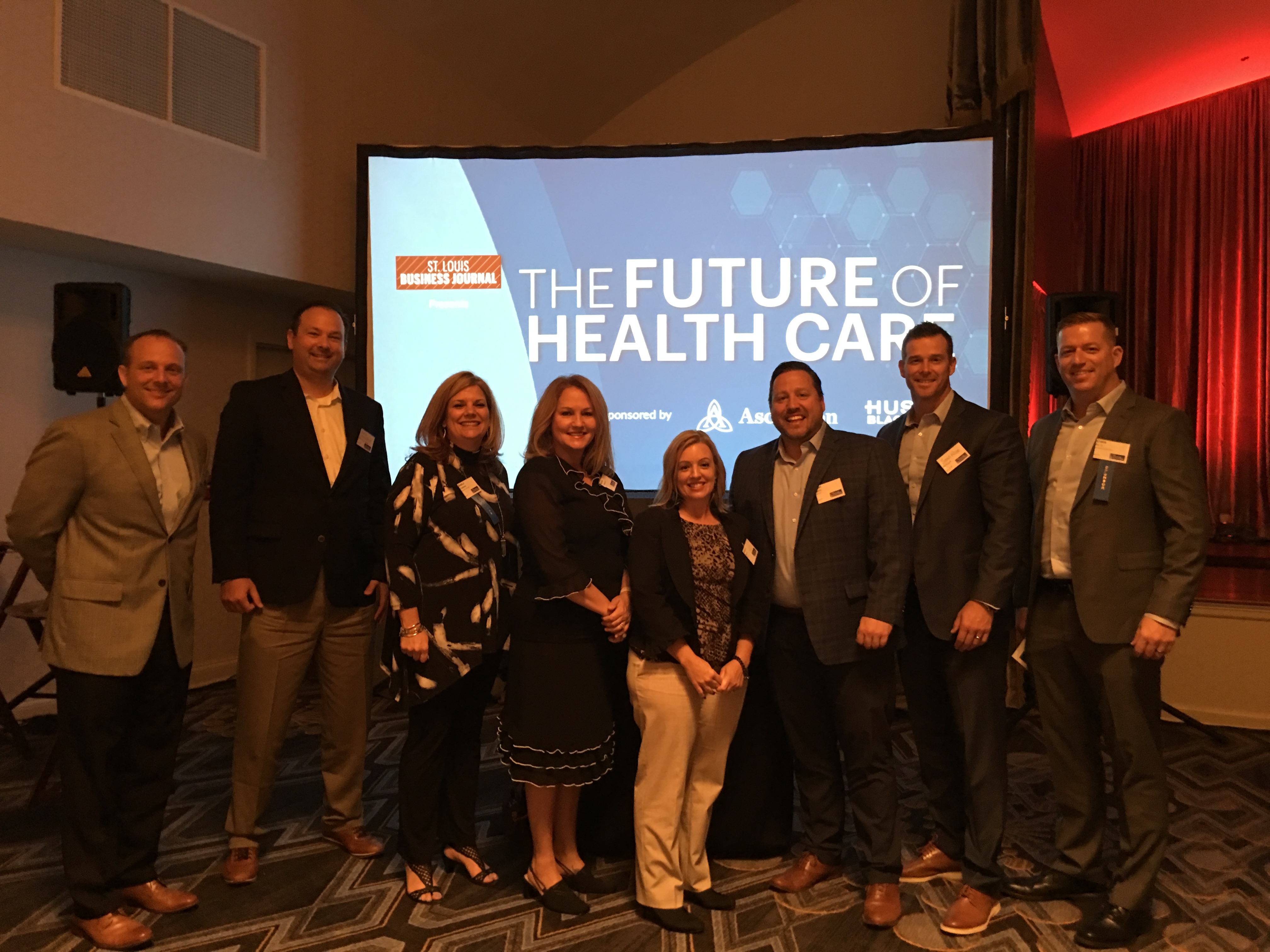The Future of Healthcare event, held by the St. Louis Business Journal, proved to be an insightful discussion of the challenges and opportunities facing the area’s top healthcare providers. Our St. Louis team gathered with their colleagues, along with 500 attendees, to listen intently on what’s next for the healthcare industry.
The panel at the event included: Christine Candio, President & CEO of St. Luke’s Health Corporation; Laura Kaiser, President & CEO of SSM Health; and Richard Liekweg, President & CEO of BJC HealthCare. Here are three key takeaways on what’s next in healthcare from the panel:
1. Access to Affordable Healthcare
In 2018 Americans spent $3.65 trillion on healthcare, equating to about $11,121 per person. So how do we reduce the cost structure of current healthcare? The panel described their mounting challenges due to the rising cost of healthcare and ways they can combat it. Laura Kaiser of SSM Health stated that part of their strategic 2020 plan is to focus on payment return for patients. As everything else evolves around us, so should how payments are made within the health field.
So how will the healthcare industry drive costs down? The answer from the panelists: collaboration. The cost of pharmaceuticals has skyrocketed in recent years. In fact, in 2016 the U.S. spent $329 billion on prescription drugs. Richard Liekweg of BJC HealthCare noted that in the future we’ll see many provider-led solutions. Kaiser provided the example of one solution that formed in recent years, Civica RX. Civica was created by hospitals, health systems, and philanthropists to help prevent drug shortages and provide a consistent supply of affordable, generic drugs.
Healthcare reform was another hot topic when discussing access to affordable healthcare. Medicaid expansion has been issue on Missouri voters’ minds for quite some time. Christine Candio of St. Luke’s Health Corporation noted that expanding it could help 200,000 Missourians who are not currently covered. A recent study by Washington University in St. Louis concluded that the expansion of Medicaid could equate to an estimated savings of $39 million. Candio asked, “why wouldn’t you do it?”
2. Consumer-Centric Care
Another major theme reiterated throughout the panel, the need to be more focused on the needs of their patients. In this day of instant gratification, it’s important for the healthcare industry to keep up. The panel spoke of looking to companies such as Amazon and other industry disruptors to see how they became so successful and a pillar in their customers’ lives. It’s important that the healthcare industry look outside the four walls of their hospitals. Consumers want to be able to get answers to their health concerns in an easy, accessible manner. Many health organizations, including those on stage, are looking to alternative ways to provide healthcare how their customers want it. Technology is playing a key factor in helping this industry evolve. Through recent years we’ve been able to access our health records through patient portals, video conference physicians, and utilize other digital tools to streamline our healthcare. Candio stated that technology will continue to improve the health industry and St. Luke’s.
3. Employee Retention
Attracting and retaining employees is a challenge in most industries, but in the healthcare industry it can be a matter of life or death. The panel noted many ways they are combatting the shortage of healthcare workers. Recently BJC announced they would be increasing the minimum wage for all of their workers to $15 an hour over the next two years. BJC also provides tuition reimbursement for their employees in addition to other educational opportunities.
Candio focused on the growing number of baby boomers retiring from the industry. At St. Luke’s they make a point to celebrate milestones in tenure for their employees. In addition, they have a learning institute and partner with local universities to attract and grow future employees.
Careers in healthcare include more than just physicians and nurses. A great need in the industry lies in healthcare analyst positions. Kaiser noted that companies such as Google are scooping up individuals interested in analytics. However, as the healthcare industry becomes more technologically advanced, the need for those who can organize and interpret large sets of medical data increases. Kaiser mentioned that SSM is working with community partners to improve the amount of healthcare analysts in the region.
The healthcare industry is evolving for the greater good. Creating affordable and accessible healthcare is a top priority for many leading healthcare organizations, including those in the St. Louis region. That can only be made possible through collaboration and a commitment to take care of our local communities.
Perficient looks forward to supporting more industry insight sessions from the St. Louis Business Journal. To read more about the Future of Healthcare event, read their synopsis here.


